He shall not hear the bittern cry
In the wild sky, where he is lain,
Nor voices of the sweeter birds,
Above the wailing of the rain.
Nor shall he know when loud March blows
Thro' slanting snows her fanfare shrill,
Blowing to flame the golden cup
Of many an upset daffodil.
But when the Dark Cow leaves the moor,
And pastures poor with greedy weeds,
Perhaps he'll hear her low at morn,
Lifting her horn in pleasant meads.
In the wild sky, where he is lain,
Nor voices of the sweeter birds,
Above the wailing of the rain.
Nor shall he know when loud March blows
Thro' slanting snows her fanfare shrill,
Blowing to flame the golden cup
Of many an upset daffodil.
But when the Dark Cow leaves the moor,
And pastures poor with greedy weeds,
Perhaps he'll hear her low at morn,
Lifting her horn in pleasant meads.
Contributed by Bernart Bartleby - 2017/12/12 - 13:05
Language: Irish
Irish version of the poem / Versione irlandese della poesia / Version irlandaise du poème / Runon irlanninkielinen versio:
Gabriel Rosenstock

Gabriel Rosenstock

Gabriel Rosenstock.
Ní chloisfidh sé an bonnán buí
Sa spéir fhiáin, is é ina luí,
Ná cantain shéimh na n-éan binn
Os cionn ghol na báistí.
Ná nuair a shéidfidh Márta garbh
A bhlosc garg trí shneachta mín
Is lasair curtha aige cheana
Faoi lusanna an chromchinn.
Ach nuair nach insan riasc níos mó
A bheidh an Bhó ach ar thalamh slán
Sea cloisfidh sé a géimneach fós
A hadharc ag lonrú ar an mbán.
Sa spéir fhiáin, is é ina luí,
Ná cantain shéimh na n-éan binn
Os cionn ghol na báistí.
Ná nuair a shéidfidh Márta garbh
A bhlosc garg trí shneachta mín
Is lasair curtha aige cheana
Faoi lusanna an chromchinn.
Ach nuair nach insan riasc níos mó
A bheidh an Bhó ach ar thalamh slán
Sea cloisfidh sé a géimneach fós
A hadharc ag lonrú ar an mbán.
Contributed by Gabriel Rosenstock - 2018/8/2 - 14:18
×
![]()
Note for non-Italian users: Sorry, though the interface of this website is translated into English, most commentaries and biographies are in Italian and/or in other languages like French, German, Spanish, Russian etc.

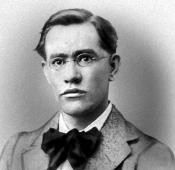


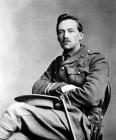
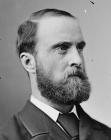
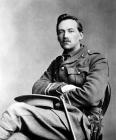
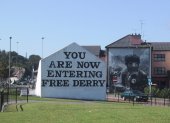
Versi del poeta irlandese Frances Ledwidge (1887-1917), nella raccolta “Songs of Peace” pubblicata nel 1917, appena dopo la sua morte, avvenuta nel primo giorno della battaglia di Passchendaele (Terza battaglia di Ypres, 31 luglio – 10 novembre 1917)
Musica del compositore inglese John Jeffreys (1927-2010)
Testo trovato su The LiederNet Archive
In questa poesia Frances Ledwidge non parla della Grande Guerra ma di un’altra guerra, quella combattuta nella sua natale Irlanda contro i britannici, gli stessi che paradossalmente l’autore stava servendo nelle trincee sul fronte francese.
Sopravvissuto a diverse battaglie a Gallipoli, in Grecia e in Serbia, assai provato nel fisico, Frances Ledwidge fece brevemente ritorno in patria proprio allo scoppio della grande ribellione irlandese nota come “Easter Rising” (Éirí Amach na Cásca).
La repressione della rivolta vide tra le vittime un caro amico di Ledwidge, il poeta e leader nazionalista Thomas MacDonagh, catturato, processato e fucilato dagli inglesi il 3 maggio 1916 nella prigione di Kilmainham a Dublino. A lui sono dedicati questi versi.